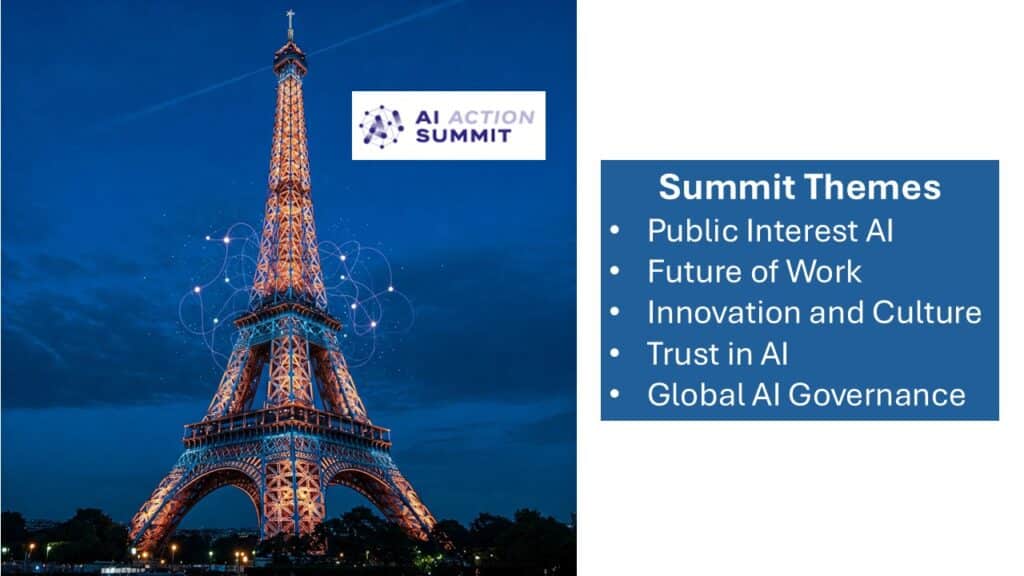AI adoption is growing at a breakneck pace and is reshaping commerce, societies, and global power structures. The Paris AI Action Summit, held on February 10–11, 2025, convened world leaders, technical experts, and researchers to navigate the opportunities and challenges presented by artificial intelligence. Against the backdrop of rapid Chinese advancements with DeepSeek and the US-backed $100B—$500B Stargate project, the summit tackled pressing themes from ethics to governance (see Figure 1 below). This blog post outlines the key takeaways from the summit and their implications for the future of AI.

Key Takeaways
1. AI is Here: From Sci-Fi to Everyday Reality
Although considered futuristic and years away, AI is no longer a distant technology—it is a present-day reality transforming industries. AI is a present-day reality evolving rapidly, unlike the other technological evolutions of the past. The summit showcased many real-world applications across diverse sectors, demonstrating how AI is being deployed to solve complex challenges. This adoption underscores the transformative potential of AI and its growing integration into the fabric of our daily lives. Today, AI is being applied in several real-world applications across sectors such as:
- Customer service: AI-powered call centers (e.g., Amazon Connect)
- Software development: AI coding assistants (e.g., GitHub Copilot)
- Consumer technology: AI integration in applications from Google, Apple, and Meta
The rapid pace of adoption underscores AI’s potential to redefine daily life and business operations worldwide.
2. Geopolitical Rivalries: Cooperation vs. Competition
While international cooperation was a theme of the summit, geopolitical fault lines were evident:
- The US and UK refused to sign the summit’s AI communique advocating open and inclusive AI development.
- China, the EU, France, and India emphasized AI as a strategic priority, with potential alliances forming along these lines.
- The race for AI supremacy is expected to intensify, shaping the future of global innovation.
Countries across the spectrum recognize the strategic importance of AI and want to ensure they are part of the action. Although the US has the lead for now, China is not far behind, while the UK, France, and India also have their sights on AI dominance.
3. The Ethics Debate: Can AI Be Responsible?
The discussion on ethical AI focused on preventing harm and ensuring AI benefits humanity. Key concerns included:
- Bias in AI models and the need for fairness and accountability
- The role of human oversight to ensure AI augments rather than replaces human decision-making
- Open-source vs. proprietary AI models, with the US and UK taking a more guarded approach compared to the EU’s preference for openness
While 61 countries, including the European Union and the African Union Commission, signed the AI Declaration, the US and UK’s absence signals ongoing debates over AI governance. There was a clear call for frameworks and guidelines to ensure that AI is used to benefit humanity and avoid unintended negative consequences.
4. The Data War: Infrastructure and Governance Challenges
AI development relies heavily on data governance and computing infrastructure. The summit discussions centered on the following:
- Data residency laws and governance frameworks
- Investment in cloud data centers, high-speed networks, and AI chip production
- The increasing demand for AI compute power, leading to concerns about energy consumption and supply chain stability
Innovations like DeepSeek maintain a balance between the demand and supply of infrastructure, but the overall need for AI solutions is undoubtedly skyrocketing.
5. Talent Crisis: The Race for AI Skills
A growing demand for AI expertise has led to a global talent shortage in:
- Machine learning
- Data science
- AI engineering
Summit discussions emphasized the need for:
- Expanding AI education programs
- Workforce retraining initiatives
- Encouraging companies to upskill employees to leverage AI effectively
With AI builders commanding higher salaries, organizations must invest in both AI development and AI adoption skills.
6. Regulation or Innovation? The Dilemma Facing Policymakers
Governments face a balancing act—regulating AI without stifling innovation. Key regulatory concerns discussed included:
- Data privacy laws and model transparency
- Accountability for AI-driven decisions
- The divergence in AI governance, with the US and UK hesitant to adopt stringent AI regulations
Finding a balance between regulation and innovation will be crucial in shaping the AI landscape.
7. AI and Jobs: Disruptor or Creator?
AI’s impact on employment was a significant theme at the summit. Discussions highlighted:
- The creation of new job roles alongside automation-induced job displacement
- The need for retraining initiatives to prepare workers for AI-driven industries
There is a risk of widening economic disparities between AI-advanced nations and those lagging in adoption. While AI can enhance productivity, coordinated approaches will be needed to manage workforce transitions and social stability.
Summary:
Unlike previous technological shifts, such as the World Wide Web and mobile devices, Generative AI has the potential to disrupt the status quo at an unprecedented scale. While it offers immense benefits, concerns over deepfakes, disinformation, and misuse must be addressed through global cooperation.
The Paris AI Summit underscored three critical priorities for the AI-driven future:
- For policymakers: Develop clear AI governance frameworks balancing regulation with innovation.
- For businesses: Invest in ethical AI development and workforce upskilling.
- For individuals: Cultivate AI literacy to stay competitive in the evolving job market.
